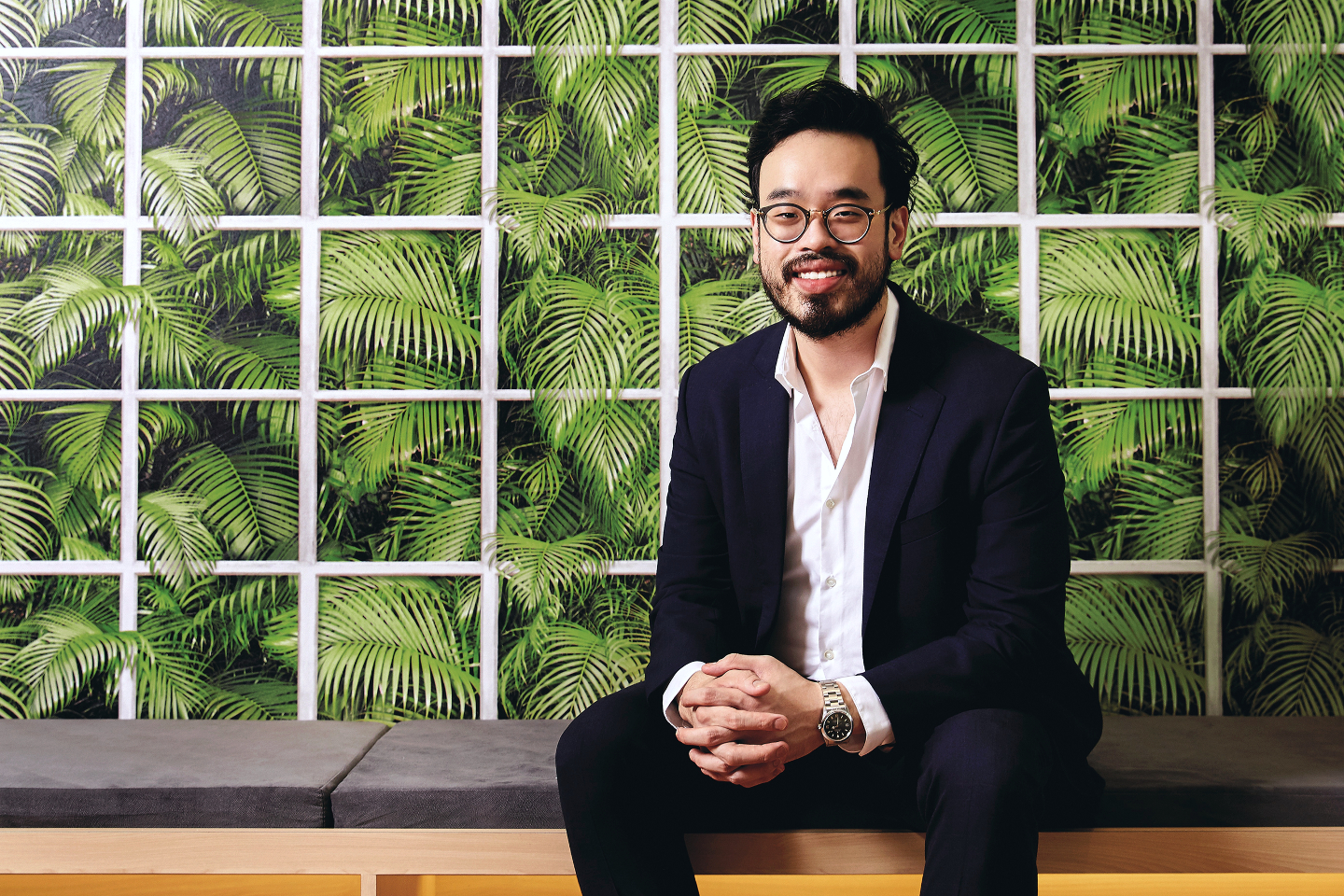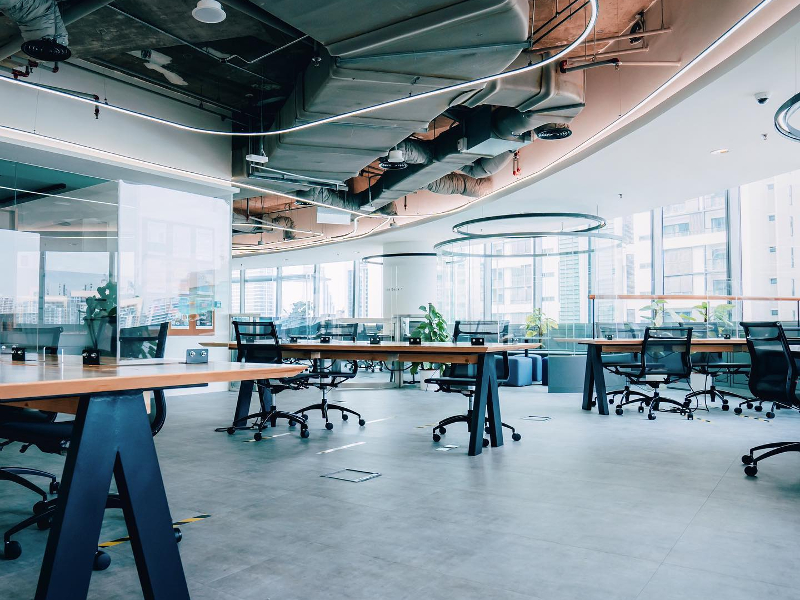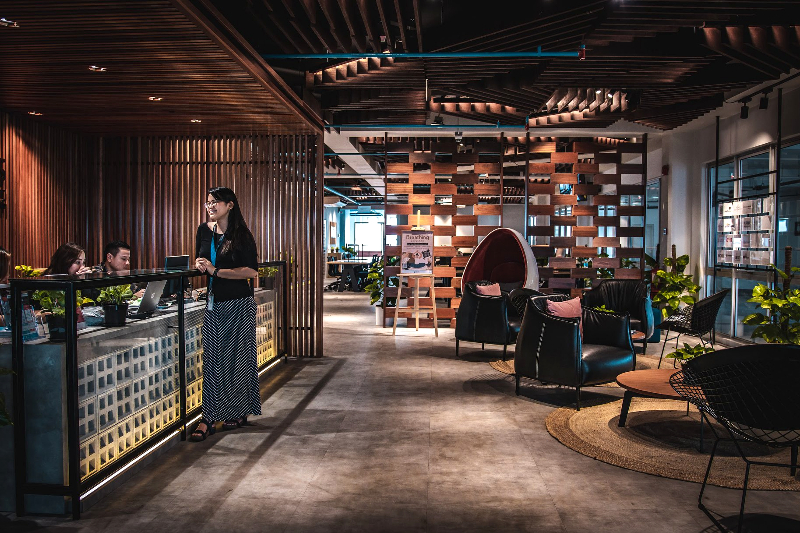
Scalable customises solutions according to what clients want via an end-to-end approach of consult, design, build and manage (Photo: Soophye)
Before the pandemic forced the world to work remotely, far-sighted companies had already begun looking at customised corporate solutions that support convenience, functionality and employee well-being. Having split teams operating from different locations was one possibility.
Picking up on how the workforce has adapted to the unheavals caused by the coronavirus since 2020, Scalable Malaysia director Benjamin Teo Jong Hian says the future of work will be more fragmented, with a more decentralised working structure. This will pose new challenges to employers.
“We started to see ‘splitting’ pre-pandemic. Covid-19 has only accelerated the trend towards decentralisation: What would have taken a decade to reach, we’re heading towards it in two years.”
Teo is also the director of Co-labs Coworking, a company that provides co-sharing workspaces designed for rising entrepreneurs, freelancers, start-ups and corporates. It launched at Glenmarie, Shah Alam, in 2017, and in the years since, he has come to realise there is an unmet demand from corporates, especially the more progressive ones, seeking office solutions tailored to their needs and requirements.
“The appetite for at least a hybrid approach to work is huge, something that cannot be ignored. We see key opportunities with the economy opening up and everyone talking about the future of work. We want to leverage our experience in operating co-working spaces and translating it through a more corporate lens.”
Scalable aims to serve the bigger boys in the marketplace, such as government-linked companies and those from industries such as banking, finance, oil and gas and privately run businesses, by scaling its products and services to cater to the entire ecosystem. There are gaps to be filled for office relocation, renovation, expansion and renewal, and new satellite offices in terms of sourcing for service and management providers, Teo notes.
co_labs_naza.jpg

Keeping its eyes peeled on the future of work, Scalable customises solutions according to what clients want via an end-to-end approach of consult, design, build and manage. Like Co-labs, it is backed by parent company Paramount Property.
On the design and build end, it taps Paramount’s experience and expertise as a builder. “We come in and source for a site and deal with the agents, landlords, contractors and authorities. We then partner with the office tenants to design and build the new space for them. We can also manage the office project,” says Teo.
As for software, Scalable works with vendors to ensure the space is up and running effectively, and offers community engagement services and facilities for clients through events and activities. With the pandemic highlighting the importance of mental health for both individuals and teams, exercise and interaction sessions that encourage employee wellness have become even more vital, he says.
At Starling+ in The Starling, Petaling Jaya, there are larger autonomous workspaces occupied by anchor tenants, alongside smaller private areas meant for start-ups and freelancers. At Tropicana Gardens Mall, which opened early 2020, the layout is Covid-compliant, with some seating arrangements that provide isolation, to avoid unnecessary exposure. In response to workplace compliances, additional safety features have been installed, among them physical partitions.
Many employees who did not have to commute to work for almost two years now expect more flexibility at work. Having been thrown into the deep end by the coronavirus, and learnt to cope, in myriad ways, they may want a say on how they want to work.
Alternating shifts, split teams and smaller offices located away from the headquarters are ideas that can allow them more leeway. Setting up a few satellite offices across the areas where they operate to support the main office, and having employees work at these alternative working spaces is one option. Or, companies could leverage technology and adopt a hybrid strategy of having staff alternate between working from home and in the office. These are considerations people are looking at and hoping their employers will provide.
Employers are welcoming their staff back, while emphasising a safe office environment. Even that poses a challenge — of engaging a workforce that has not been back to the office or has not had that physical interaction for almost two years. “Lots of people are scrambling to find that secret recipe, that secret sauce, to bringing employees back again. There is a huge working population, especially the young, who don’t want to return to the physical office.”
But new workplace trends will eventually fall into place and customising what fits the future of work, post-pandemic, requires mindful consideration of employer and employee needs, as well as the nature of their business.
The co-working model is here to stay and Scalable wants to capture a lot of the renewed interest in creating an office space that is engaging to the workforce, compliant with health and safety requirements, and designed and built in a cost-effective and efficient manner. Flexible and progressive workplaces have been found to improve employee performance, well-being and happiness.
“We know how to design and build a good space, and operate it. We know how to deliver quality products in a timely manner,” Teo says, quietly.
“Office facilities and community management have been around in the industry for many years but we are trying to put a youthful spin to it, to bring millennials back into the office.”
Digitalisation fuelled the work machinery during the pandemic and kept employees in touch. But the physical and emotional connection was missing and he thinks workspaces can bring something to the table, pull factors that can entice employees to return. It all goes back to employee engagement and wellness, dictated by human capital and the requirements of clients.
Fun activities — from jewellery-making to painting, quiz nights, yoga, meditation and talks on professional development — were what tenants at
Co-labs looked forward to before the lockdowns. Teo wants to tap this network and offer similar services to corporates through Scalable and create connections.
From his experience of helming co-working spaces, he finds that physical-related space activation through health and professional talks, or lifestyle-related programmes can spark activity in a workspace, giving employees a chance to align themselves with working there again.
Many people who want to stay at home reason that the hours saved from daily commute can contribute to higher productivity. Besides, with digitalisation, everyone is connected, and faster too. But, like it or not, the remote working model is not ideal for many employers, who want staff back so they can have a bit more oversight of them.
Speaking anecdotally for himself and his peers, there is a big demand for a decentralised or hybrid approach to work, Teo adds. “We have to be sensitive to where we operate in. We need to have the necessary checks and balances to really create a working culture for both the young and the old to operate effectively in these times. It’s really about reimagining the work culture within the company and trying to establish the right kind of values so we can operate in a more decentralised manner.”
On the flip side, complaints of bosses contacting their staff about work at odd hours and even public holidays are not uncommon. “That is essentially why there is a renewed focus on employee wellness. Over the last four years at Co-labs, we have done lots of engagement concerning physical and mental health.
“We really need to understand what the use case for the office will be. It’s no longer as linear as just a workspace. It needs to be an avenue for you to develop yourself, meet new people, grow your professional network, have social interaction and get your work done in an efficient manner. The onus is on us to drive what we think the future of work will be.”
For now, what is clear is that demand for co-working space will continue to grow. Co-labs, which has five locations across the Klang Valley, saw its spaces fill up quite quickly after the economy shifted back into gear. Again, as a response to the pandemic, there has been a definite move towards flexibility.
co_labs_shah_alam.jpg

Teo says Scalable is well-positioned to offer clients the same convenience. “We know how to create multipurpose spaces that can double as work spaces and can design elements to provide this kind of flexibility.”
Ultimately, it is about having a good address, a professional suite of services with a front desk and support team, and access to meeting rooms, a café and a network of other tenants. “If you are a B2B company — we have a lot of such in our spaces — it’s about having access to 50 to 100 different companies, which is quite a good way to build awareness of your offerings. We’ve seen people sparking ideas from collaborating with each other and even cultivating romantic relationships.”
Teo says as a new entrant in the design and build space, Scalable will need time to build a portfolio and its standing in the industry and thinks the Klang Valley is the ideal place to do so.
What makes it and Co-labs unique, he adds, is that they are supported by a host of experts across different verticals to address all the office solutions that clients need. “That’s what we really pride ourselves on. We have a team of experienced architects, builders and a whole range of consultants to build and deliver the space for you. And of course, we have experts in terms of managing the space, facilities and community. Very few co-working spaces have this kind of backing.”
“Having a reputable developer provides a lot of comfort to clients who know that even though we are new in this space, we have a trustworthy name behind us. What’s more, Scalable has been able to leverage the financial might of Paramount by providing a credit facility for the capex requirement for any built facility, which reduces the capex for the client as well as the cash flow burden.
“In that sense, we are able to [spread out in the form of rent] the capex over the course of a typically three- to six-year horizon, matching their tenancy with where their office is being set up,” he explains.
On what clients contemplating an autonomous workspace want, he ticks off efficiency during the whole fit-out period, budget and the overall quality of the product. For the most part, in times like these, the biggest consideration is cost, with companies wondering how many offices they might need to set up.
“That’s where we come in as reputable builder: We can build quality within an accessible budget because we have the know-how and have access to different raw materials. There’s a sustainable play there as well, if your company is so inclined. We know how to deliver a good product within a budget.”
Teo is thankful that pre-Covid, Paramount’s property division had moved to Co-labs in Glenmarie, where it is now the anchor tenant. “I must say it was great foresight by our group CEO to put us on that path as it kind of equipped us with the know-how to pivot towards the co-working model. With space at a premium, we had to digitalise a lot of our processes. With 1½ years’ head start before the pandemic hit, we had an easier time than many other traditional companies.”
Pivoting is something Teo has had to do on a personal capacity in the last year, as his portfolio was expanded to helming Paramount Group Bhd as deputy group CEO, on top of leading Co-labs, Scalable Malaysia, and fine-dining restaurant Dewakan, a fully-owned subsidiary of Paramount.
With the mushrooming of cloud kitchens, he reckons there could be something there too. But with no expertise in the F&B industry, especially mass-market offerings, he admits this is not something the team has domain knowledge of to do well in.
However, cloud kitchens are very much in line with the co-working model and ever open to innovation, he does think there is opportunity in that space. “It’s being very much on the leading edge of what we are trying to do at Co-labs or Scalable and that kind of lends itself to new opportunities.”
Progressive is one word that could well describe Teo too, although this young man demurs. “I don’t think I’m a very innovative guy — I’m no visionary in that sense. All these kinds of workplace solutions, we see them playing out in the West already. I am just trying to be opportunistic by finding a gap in the market and bringing the solutions here.
“The co-working model is mature and has become a mainstay in office solutions in markets such as the US and UK. We have already seen a few operators like us trying to address the need for bigger corporations.”
Looking ahead, Teo says tech natives — for whom living and working online is the entirety of their work and life experience — will be the workforce of the future. “I really don’t think this trend towards digitalisation and decentralisation will stop. We’re starting to see that in the cryptocurrency space, where you have big, big decentralised autonomous organisations that operate just online, and big companies with very big products and services that do so too.
“There needs to be some impetus for employers to sit down, really dig deep and understand where this is heading because the way we work has been completely disrupted by the pandemic.
“A lot of new job roles have become so accepted now. The nature of work has changed but humans are very resilient. It will be very interesting to see how this plays out in the next five years.”
This article first appeared on Feb 14, 2022 in The Edge Malaysia.


